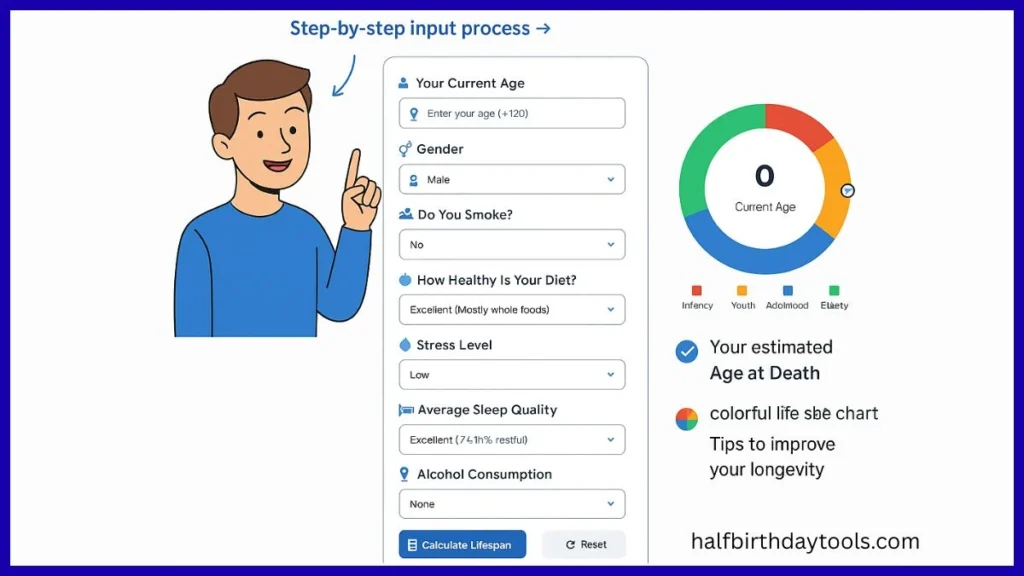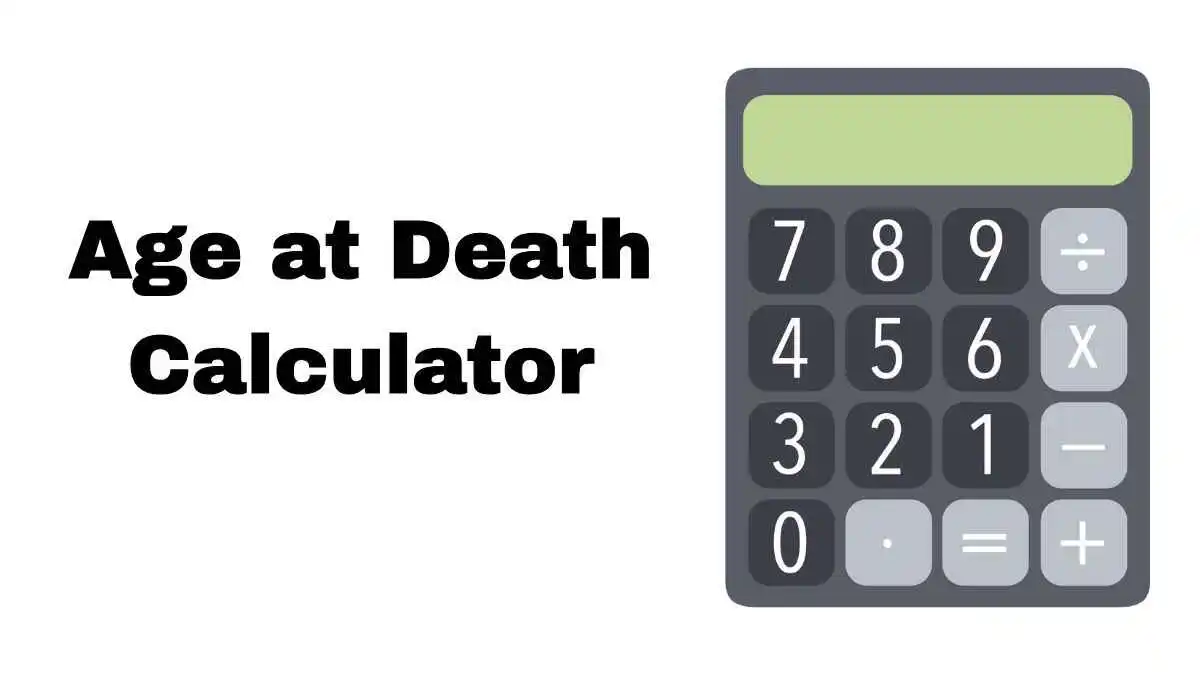Ever wonder how long you might live? It’s a weird question, but not an uncommon one. An Age at Death Calculator offers a surprisingly thoughtful way to estimate your lifespan based on your habits, health, and background. Whether you’re planning for retirement or just caught yourself thinking, “How long do people usually live like me?” this tool gives you a clue, not just a number.
And it’s not just guessing. These calculators use real data, health records, behavioral trends, and sometimes even artificial intelligence, to give you a fairly reasonable estimate. Things like your diet, sleep, and stress? They matter more than most people think.
Table of Contents
What Is an Age at Death Calculator?
It’s basically a tool that tries to answer the unanswerable but in a useful way. You enter some details about yourself: your age, gender, and lifestyle choices. In return, it gives you an educated prediction about your life expectancy.
It’s not perfect; nothing about predicting life is, but it’s better than pulling a number out of thin air. These tools are cousins of life expectancy calculators or longevity estimators, and they’re often used for things like retirement planning or even just self-reflection.
How Does the Age at Death Calculator Work?

The calculator estimates your age at death based on:
1. Base Life Expectancy by Gender
Base life expectancy by gender refers to the average number of years a person is expected to live based solely on their gender, before considering lifestyle or health factors.
Here’s what it means for each:
- Females generally live longer due to biological and lifestyle factors.
- Average: 83 years
- Males have a slightly shorter life expectancy, often due to higher risk behaviors and health conditions.
Average: 78 years - Others (non-binary/unspecified) are given a balanced midpoint.
Average: 80 years
2. Adjustments Based on Lifestyle Factors
Adjustments Based on Lifestyle Factors means the calculator adds or subtracts years from your base life expectancy depending on your daily habits and choices.
| Factor | Choice | Adjustment (Years) |
|---|---|---|
| Smoking | Occasionally | –3 years |
| Yes (regularly) | –7 years | |
| Exercise | Daily | +4 years |
| Few times/week | +2 years | |
| Rarely/Never | –2 years | |
| Diet | Excellent | +5 years |
| Good | +2 years | |
| Poor | –4 years | |
| Stress | Medium | –1 year |
| High | –4 years | |
| Sleep | Excellent (7–9 hrs) | +3 years |
| Poor (<6 hrs) | –3 years | |
| Alcohol | Moderate (1–7 drinks) | –1 year |
| Heavy (8+ drinks) | –5 years |
3. Final Lifespan Estimation
Final Lifespan Estimation is the last step, where the calculator adds up everything to predict your estimated age at death.
Here’s how it works:
- It adds or subtracts lifestyle adjustments to your base life expectancy.
- Ensures the result is at least 1 year more than your current age.
- Caps the maximum age at 120 years for realism.
4. Output
The output of the Age at Death Calculator shows your results in a clear and interactive way:
- Estimated Age at Death—Your predicted lifespan.
- Years Left—How many years you might have left.
- Progress Bar – Visual display of how far you are through your expected life.
- Circle Chart – A pie-style graph showing age progress.
- Lifespan Improvement Tips—Suggestions to help you live longer and healthier.
Simple Formula Behind It
Predicted Age at Death = Base Life Expectancy ± Lifestyle Adjustments Example: A male who exercises daily (+4), eats well (+2), and smokes occasionally (–3): 78 + 4 + 2 – 3 = 81 years
How Accurate Are These Tools?
Short answer: they’re not crystal balls. But they’re not useless either. Most life expectancy calculators pull from massive health databases—CDC, WHO, and long-term studies. So while they can’t pinpoint your exact end date (thankfully?), they can often estimate within a 5–10 year range, assuming no unexpected curveballs. It’s more about direction than destination.
Types of Life Expectancy Calculators
There’s more than one kind out there. Some ask basic stuff like age, gender, and smoking status. Others dive into medical-grade detail, maybe even using your cholesterol levels or blood pressure. And some use AI to adjust results based on behavior trends.
| Calculator Type | What It Includes |
|---|---|
| Basic Predictor | Age, gender, lifestyle inputs |
| Medical-Grade Estimator | Clinical data like blood tests |
| AI-Powered Calculator | Learns and updates based on patterns |
| Longevity Apps | Tracks health habits over time |
You can pick the level of detail you’re comfortable with.
Why Even Use One?
People use these tools for different reasons. Some are planning their retirement. Others just want a wake-up call. If a calculator says you might only live to 67 and you were hoping for 85, it might be the nudge you need to eat better or sleep more.
Doctors sometimes use them too, as a reality check for patients. Even insurance companies rely on similar logic when setting premiums.
A Word of Caution (and Compassion)
Not everyone reacts the same way. Some feel empowered seeing their numbers. Others? Not so much. It can feel a little… heavy. That’s okay. The important thing is remembering: this is an estimate. It’s a tool for awareness, not anxiety. If it motivates you to take better care of yourself, that’s the win.
Want to Live Longer? Small Changes Matter
Adding just 30 minutes of light activity each day? That helps. So does staying hydrated, building good relationships, or even laughing more. A longevity calculator might reflect these changes over time. Try one today if only to check in with yourself.
Related Calculator
Final Thoughts
Should you trust an age at death calculator? In a way, yes. Just not blindly. It gives you a glimpse, a guide, a maybe. Not a guarantee. Use it to reflect, adjust, and maybe rethink a few habits.
So if you’ve ever asked yourself, “How long will I live?” you’re not alone. But maybe a better question is, “How can I live better?”
Try our free Age at Death Calculator today. It’s not about the number it’s about what you do with it.
Frequently Asked Questions
How to calculate age from date of death?
You simply subtract the person’s birth date from their date of death. That gives you their exact age—years, months, and even days. It’s a straightforward calculation, though sometimes people forget the months and stop at the year.
How do you calculate the expected age of death?
This one’s tricky. We usually refer to life expectancy tables or use online death calculators. These tools consider things like gender, current age, and lifestyle. Of course, it’s all based on averages, not a guarantee.
How do you calculate death time?
Honestly, you can’t unless you’re a doctor or someone was there. Time of death is a medical determination. It’s not something you can figure out just by looking at dates or making assumptions.
What is the 8870 method?
The 8870 trick is a math curiosity. It’s supposed to confirm someone’s birth year and age using basic calculations. But, to be clear, it’s more of a party trick than a valid method, not scientifically reliable.
How do we check our age?
Simple. Take today’s date and subtract your birth date. That’s it. The result gives you your age. Some people use online tools, but honestly, a calendar and some quick math can do the job too.
What is my birth date from my death date?
To find your birth date, subtract your age at death from your death date. It’s a reverse calculation. Though you won’t get the exact birthday without more details, it gives you a close idea.
Is the death clock real or fake?
It’s not real in a scientific sense. The death clock is just a fun prediction tool—kind of like a digital crystal ball. It might make you laugh or think, but don’t base your life on it.
How to calculate death age in astrology?
In astrology, they look at the time of birth, star signs, and planetary placements. But again—this isn’t science. It’s a belief system, and predictions vary wildly from one astrologer to another.
What is my lunar age?
Your lunar age is used mostly in Chinese culture. It’s often 1–2 years older than your Western age because it counts time in the womb as part of your age. Some traditions use it for astrology and festivals.

